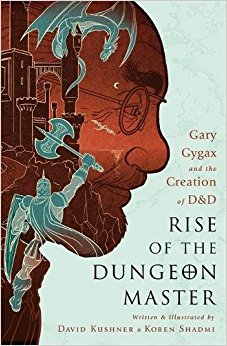Thursday Comics Hangover: Rolling the dice for charisma

It's a kind of nerdception: Rise of the Dungeon Master is a biography of Gary Gygax, inventor of Dungeons & Dragons, told in comic book form. Writer David Kushner and artist Koren Shadmi do excellent work transforming what could be an incredibly dry subject — Gygax's slow construction of Dungeons & Dragons from pieces of miniatures-based military reenactment games — into a breezy biographical story. Rise is a book that shouldn't work, for several important reasons.
It's told in second person. While just about any writing instructor would urge a biographer to not write a book with "you" as a subject, second-person works here because it follows the format of a Dungeons & Dragons game. ("Your mother also fills your imagination with adventure," the captions inform Gygax like a Dungeon Master equipping a player for an oncoming battle, "she reads you Tom Sawyer and Huck Finn.")
Shadmi's art is very cartoony. Realism isn't necessary for a biography — Peter Bagge, with his rubber-armed figures, has somehow become one of our best comics biographers — but the mundanity of Gygax's upbringing and the gaudy muscularity of Dungeons & Dragons would seem to call for realism. Instead, Shadmi's likenesses, with their big, rounded Disney faces and their exaggerated poses, somehow add to the familiarity of Gygax's story, making him more relatable.
There's not too much of a narrative arc. The story follows D&D's meteoric rise in popularity and its controversial period in the 1980s when it became associated with Satanism and juvenile delinquency, but generally not too much happens in the story. Gygax is a dedicated process nerd who invents the game, and it quickly becomes an American standard.
Despite these seeming drawbacks, Rise works on multiple levels. Kushner ingeniously compares D&D to an operating system, and that metaphor instantly gives the story of the game a more familiar shape. At this point in the 21st century, we know the story of the successful Silicon Valley startup by heart, and that tech creation narrative lends its own drama to D&D's history, adding a friction that other accounts of Gygax's life don't really enjoy.
One major flaw of Rise comes in a choice with the book's lettering. The second-person narration captions are the same basic shape as the captions that contain Gygax's quotes, often leading to a confusing mishmash of perspectives, switching back and forth from "I" to "you" without much of a visual difference besides some ragged caption borders. A stronger visual cue, such as putting quotes in rounded word balloons rather than square ones, would make for an easier, less-muddled reading experience.
But aside from a few stumbles caused by that muddled narration, Rise is a chatty book that neither wallows nor sidesteps its subject's inherent wonkiness. D&D nerds and novices alike can find new information here. It's a miracle of explanatory storytelling, and it builds to a climax that is artful and genuinely affecting. This biography is more than just a series of things that happened — it's a celebration of a genuinely new invention that changed the course of history.